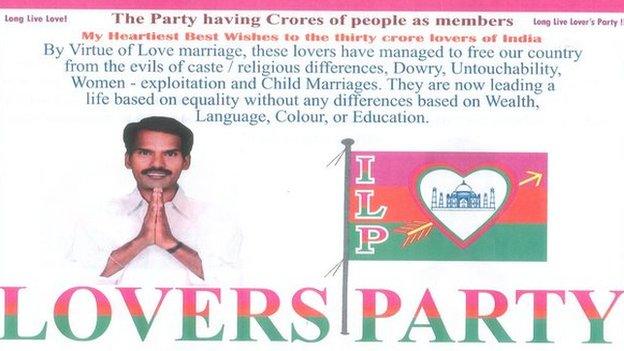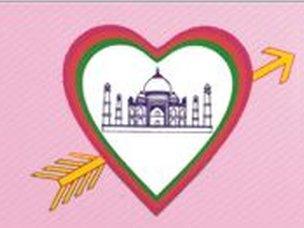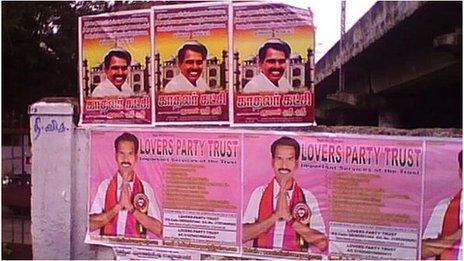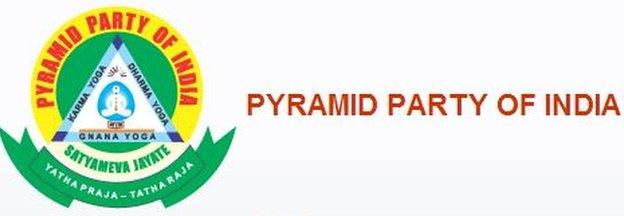Indian political parties with strange names
- Published

Indian Lovers Party website message
In April, India's 814 million eligible voters are due at the polls. There are more than 1,600 registered political parties - some with very unexpected names.
B Kumar Sri Sri launched the Indian Lovers Party on Valentine's Day 2008. His bubble-gum pink posters announce the party's resolve to fight for star-crossed lovers from different castes and religious backgrounds, whose parents don't approve of their relationship.
He's putting up candidates in the state of Tamil Nadu in the forthcoming elections and is hopeful they will secure 40-50,000 votes - much more than the 3,000 votes he got in the 2011 state elections. The party is already registered in Tamil Nadu, but after the election he plans to get federal registration, using his own design - the Taj Mahal framed in a heart - as the party's symbol.

Symbol Kumar wants for his party
To register a party, external with the Election Commission, you need to supply a host of details, including name, address, number of members (at least 100), objectives and structure. Then, once the registration fee of 10,000 rupees (£100) has been paid, "there you are, you have a party," says Anil Verma, head of the Association of Democratic reforms, a Delhi-based think tank.
The Election Commission can reject the application if certain conditions aren't met, he adds, - for example, if the name has an obvious caste or religious reference.
The Religion of Man Revolving Political Party of India managed to get registered, though.
"The name has everything in it - man, religion, political, party, India and most importantly (and inexplicably) 'revolving'," writes journalist Soumyadip Choudhury in his blog, external. Choudhury is not new to unconventional names. He says they are common in the north-eastern part of India, where he is from. "That we once had a minister called Adolf Hitler should be indicative enough," he says.
It's likely the name Religion of Man Revolving Party is an odd translation from a local language, he says.
"It is obvious that most of the popular parties are not very adventurous when it comes to choosing names. In such monotony of political party names funny names are actually welcome."
Other parties with odd names, at least in English translation, include the Poor Man's Party and the Yours-Mine Party. The first splintered from the Common Man's party - which recently won the Delhi elections. The Yours-Mine party supports "nationalism, Indianism and one-ism" according to its website.

Indian Lovers Party posters
The Indian Oceanic Party, launched in 2010, claims to be "an ocean of philosophies, an ocean of honest people, an ocean where the power of creating a prosperous India is developed" its website says. The party symbol, however, is not an ocean or a wave but a telephone - representing a connection between people.

The Pyramid Party of India, meanwhile, has been around since 1999 to "spread the twin concepts of vegetarianism and meditation". The name borrows from a local movement that advocates meditation as the "true source of wisdom".

Pyramid Party of India symbol
Then there is the Stay Awake Party, a recent addition to the Election Commission's list of registered parties. The name echoes the cries of watchmen on the graveyard shifts who yell "stay awake!" periodically to remind each other to be vigilant. The cries, punctuated with the thumps of their batons, also double as warnings for prospective thieves.
Watchmen only guard small neighbourhoods, but the the members of this party "have to guard the nation," says its founder, anti-corruption activist Praful Desai. He wants the party to serve as a corruption watchdog, though for this election, he is supporting a bigger, mainstream party with a similar programme.
Technically, if parties don't fight elections for six consecutive years they are supposed to be taken off the registered list, but sometimes nobody bothers, Verma says. People often create parties for social prestige and power, and also for perks like tax exemptions, he adds.
"The irony is that a whole lot of them get registered and never fight elections."